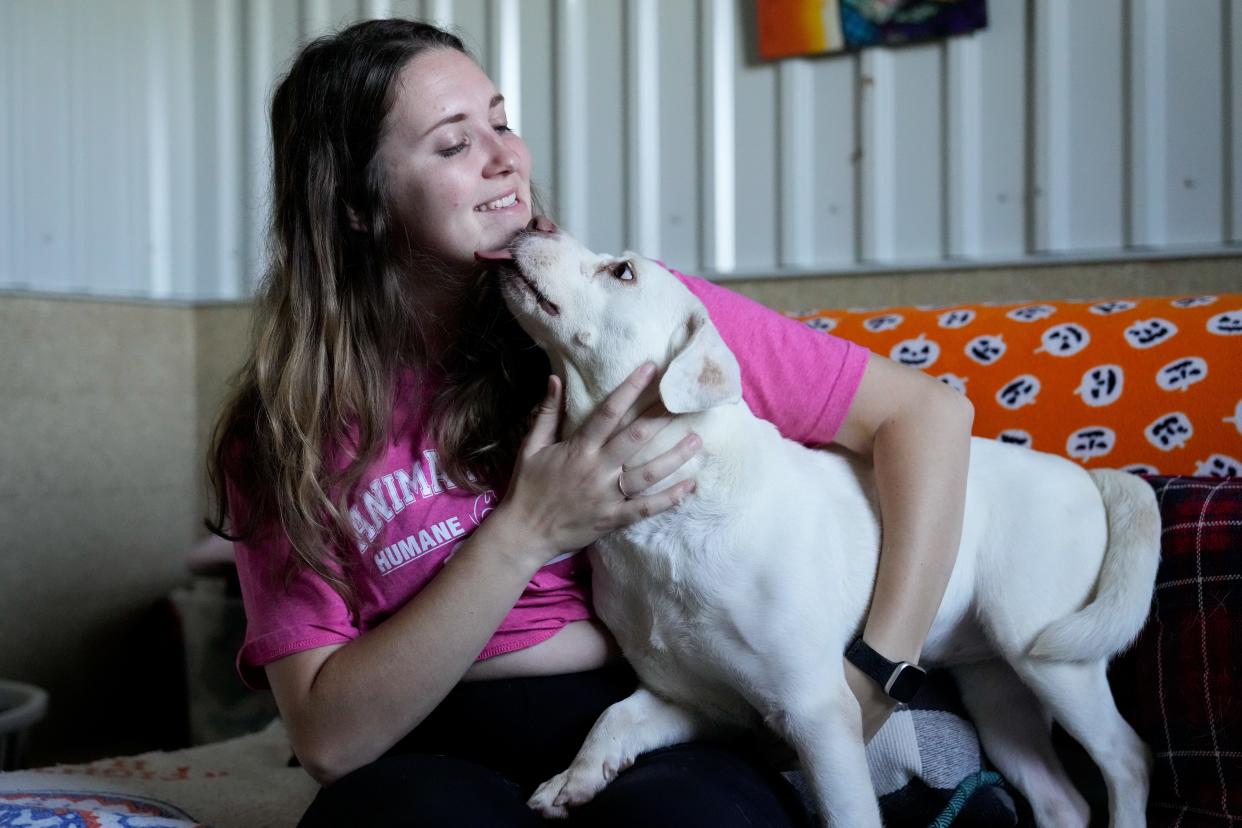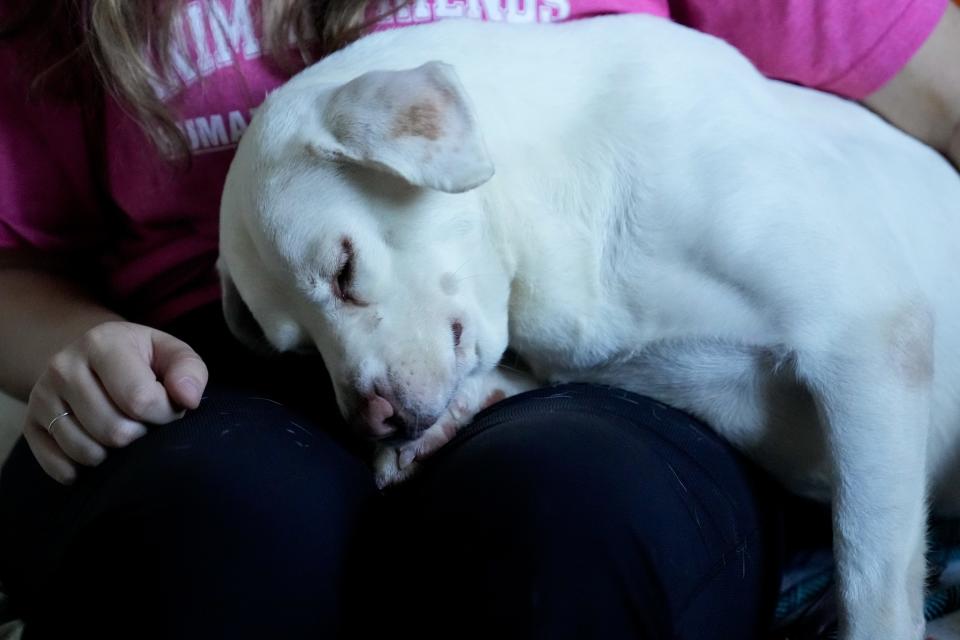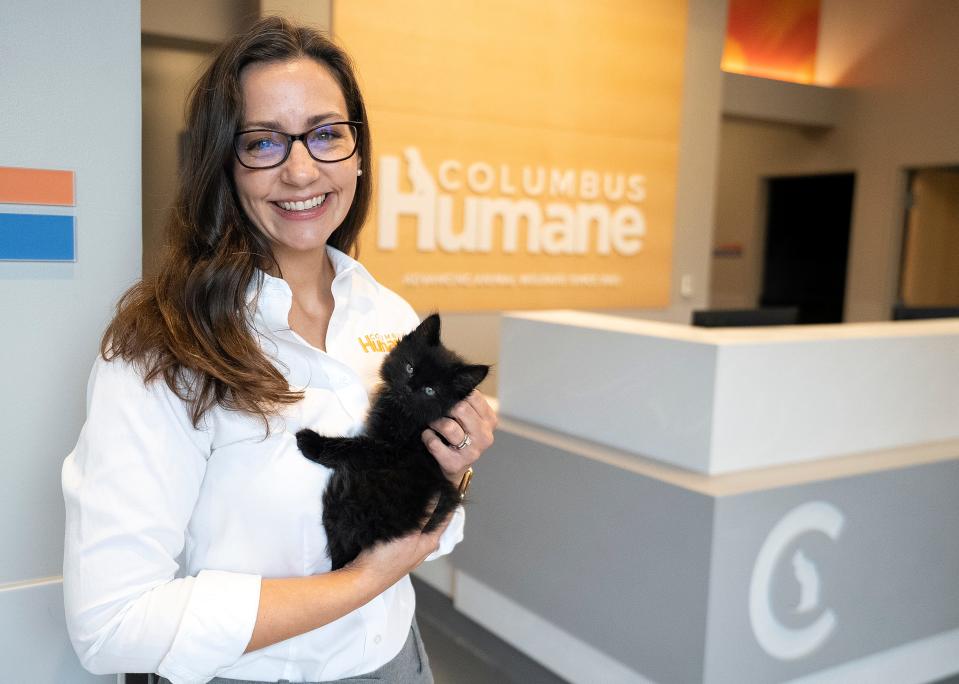'A rubber stamp': Little to no oversight exists for Ohio animal rescues

A little over two months after Shelby, a white-coated, 44-pound canine, was taken from the nightmarish conditions of a Butler County dog rescue, she suffered a seizure.
It was probably caused by stress, said staff at Animal Friends Humane Society in Hamilton. That’s where 6-year-old Shelby and 91 other dogs, in need of housing and care, were taken after they were seized from the Helping Hands for Furry Paws dog rescue in July.
Though Shelby had since taken to her new caretakers and other dogs at the shelter, she was one of the most terrified when she arrived and never wanted to interact with people, said Megan Poffenbarger, intake coordinator.
What happened at the Madison Township dog rescue, where more than two dozen other dogs were found dead in varying states of decomposition, is a stark example of what can result from a lack of oversight.
Animal rescue owners in Ohio are subject to the same criminal penalties as anyone else who abuses or neglects animals. But these organizations largely go unregulated and investigating animal cruelty complaints is difficult. In the absence of a reasonable basis to believe a crime is being committed, officials must rely on an owner's cooperation.
In fact, it took years of complaints and dozens of visits to Helping Hands for Furry Paws before authorities had enough evidence to file charges. In another case last summer involving a Portage County dog rescue, where officials found the remains of 146 animals, humane agents investigated for nearly a year before they were even able to get a search warrant.
“It’s easier to take a child than it is to take a dog,” said Poffenbarger, who worked for two years as a deputy dog warden in Butler County.

Dog wardens found deplorable living conditions for dogs and puppies
Deputy dog wardens couldn’t have prepared for what they say they found while searching Ronda Murphy’s properties on Mosiman and Eck roads on July 27.
There were cages filled with dogs inside an 83-degree garage, including one that housed a mother dog and her nine pups. A deputy dog warden wrote in an incident report that none of the cages had food or water and many of the dogs were living in their own feces.
A van parked in Murphy’s driveway contained four cages of dogs, and a chihuahua was loose in the front of the vehicle. Among those caged were three more female dogs each nursing a large set of puppies. The van wasn’t running and the windows were rolled up.
Another nursing mother and her seven puppies were found in a cage inside the house where 60-year-old Murphy ran her rescue. The dog was emaciated and the cage contained dirty blankets and piles of feces.
Inside a pole barn is where deputies first stumbled upon a dead dog. Murphy claimed she discovered the animal’s body a few weeks earlier and was unable to move it on her own.
Officials argued the dog had likely been deceased much longer given the level of decay. It was only recognizable by its shape and legs, with the body lacking hair and being stuck to the floor.
The most shocking discovery, however, was when authorities found the remains of other dogs in freezers, some of which weren't working, scattered throughout the two properties.
In total, deputies uncovered roughly 30 dead dogs, though they could only recover the remains of 18 because some had decomposed to the point that their bodies were liquefied.
“It was nauseating and made it almost impossible to breathe," Deputy Dog Warden Abigail Forkner wrote, relaying the conditions of one of Murphy's houses. "After just a minute of being inside, walking further in became unbearable. I felt as if I was going to pass out and had to go outside for a break.”
Murphy, who owned and operated Helping Hands for Furry Paws from the Eck Road property that sits just across the street from her home, faces nearly two dozen counts of cruelty to companion animals.
Years-long history of animal welfare complaints, inspections at Butler County rescue
Murphy's neighbors and others had long complained that something wasn’t right.
Butler County Sheriff’s Office records show that deputies responded to Murphy’s two properties at least 36 times from February 2020 to July 2023 to check on the animals’ welfare and respond to complaints about the conditions there.
Deputies struggled at times to meet with Murphy and often had to leave notices behind for her.
On at least one occasion before Murphy’s arrest, deputies showed up at her home unannounced because they suspected she was concealing the true number of dogs under her care and the conditions they were living in.
Officials also received reports over the last three years that Murphy was housing dozens of dogs in deplorable conditions, lying to authorities and keeping animal remains in freezers.
None of those claims were substantiated until deputies made an surprise, early morning visit to her property last summer and found enough evidence of animal cruelty to obtain a search warrant.
Under state law, animal cruelty encompasses torture, needless killing, causing serious physical harm, or deprivation of adequate food, water and shelter, negligently or otherwise.
More than a year before her arrest, the records show, deputy dog wardens told Murphy she should get out of the dog rescue business. She agreed.
While they long suspected Murphy was struggling to adequately care for her animals, without evidence of animal cruelty, there was nothing officials could do under the state's lax regulation of animal rescues.
Murphy’s lawyer did not respond to messages from The Enquirer.
Advocates say rescue registrations are 'just a rubber stamp’
All dog rescues must register annually with the Ohio Department of Agriculture, but there’s nothing stopping someone from operating without a registration.
Murphy had been doing just that during the seven months before her arrest, state records show.
The Enquirer requested all dog rescue registration applications submitted to the state by Murphy since 2016, when state records show Helping Hands for Furry Paws was first established. In response, the department provided a single application from 2022.
“This registration does not confirm or otherwise prove that the registered animal rescue meets any requirements for the care, health, or housing of dogs,” reads the document confirming Murphy’s successful registration for Helping Hands, which expired in December 2022.
Unlike licensed high-volume dog breeders, which are subject to annual inspections, there are no legally mandated inspections for dog rescues, though state officials do have the authority to inspect such organizations if a complaint is received.
However, the department can only check to ensure that registration requirements are being met and any humane or welfare concerns are reported to local authorities, Bryan Levin, an agriculture department spokesperson, wrote in an email to The Enquirer.
The department has no authority to impose civil or criminal penalties against dog rescue owners in cases of animal mistreatment, with its only recourse being to revoke the violator’s registration.
To register, an organization must meet the state's definition of a dog rescue and provide its name and address, as well as the names and addresses of foster homes it partners with. State law has no stated registration requirements for rescues specializing in animals other than dogs.
“It really is just a rubber stamp,” Colleen Evans, executive director of the Ohio Animal Welfare Federation, said of the state’s registration of dog rescues.
When it comes to a lack of serious oversight for animal rescues, Ohio isn’t alone. The state is 25th in the Animal Legal Defense Fund’s most recent ranking of animal protection laws.
Some states, however, have enacted comprehensive licensing laws with stricter oversight of rescues. Colorado, which is ranked fourth in the country for animal protection laws, is one state where lawmakers established regulations for animal rescues that require routine inspections and education courses.
Ohio does not have enough inspectors on staff to inspect rescues. The agriculture department has five inspectors handling inspections of the more than 500 registered high-volume dog breeders across the state.
“It’s a great idea on paper. It’s a nice idea to have some kind of oversight, but right, who would do it?” Evans said.
Currently, the only way animal rescues in Ohio get investigated is if someone lodges a complaint with the county humane society or sheriff's office, Evans said, adding that while people in the community might know something is going on, there are numerous reasons why they might be hesitant to report.
“So sometimes these cases can go on a long time before we even know the situation exists,” she said.
How do authorities investigate animal cruelty?
Complaints are vital for Columbus Humane, the agency tasked with investigating animal cruelty in Franklin County.
With its agents making 5,000 to 6,000 visits each year in the course of responding to and investigating complaints, Columbus Humane has the largest animal cruelty investigations program in the state.
The first step humane agents take when they receive a complaint is to try to establish rapport with the owners and ask if they can take a look at the animals, said Rachel Finney, the nonprofit's CEO.
If the owner is unwilling to work with agents or attempts to improve the situation are unsuccessful, the agency will seek access through a search warrant.

“We don’t go in with the intent to remove every animal every time, that doesn’t make sense,” Finney said. “We’re not trying to prosecute everyone in our community.”
Agencies responsible for enforcing the state’s animal cruelty laws walk a fine line, as animals are considered property and a person who doesn’t take great care of their pets isn’t necessarily breaking the law.
During the numerous visits Butler County officials made to Murphy’s properties from May 2021 to July 2022, they at times noted some dogs were underweight, losing hair and living in "filthy conditions," but didn't observe anything illegal.
Animal hoarding and animal cruelty at rescues often go hand in hand
Complaints against animal rescues often come from veterinarians who treat the animals under the organization's care or, if the rescue is being operated from a residence, from neighbors concerned with strong odors and loud barking, Finney said.
“Because almost anyone can call themselves a rescuer, there's a lot of overlap with the investigation of hoarding cases,” Finney said.
Animal hoarding is a condition characterized by the collection of an “abnormally large” number of animals with the hoarder neglecting their basic care, according to the Animal Legal Defense Fund.
Living conditions can become extremely unsanitary at properties where animal hoarding exists. When hoarding cases are uncovered, they can also overburden the local humane societies and shelters tasked with caring for and finding new homes for the animals.
Animal hoarding has been found to have a near 100% recidivism rate if left untreated.
"It's compulsive behavior that does not stop on its own, it needs an intervention, and that's the role that our agency often plays in hoarding situations," Finney said.
One important piece of securing a criminal conviction for animal cruelty against someone who hoards animals, she added, is that a court can limit their access to pets and allow for unannounced inspections. A judge can also order that they undergo a psychological evaluation or counseling.
Animal rights activists have gone so far as to advocate for known hoarders to lose all contact with animals entirely in an effort to prevent such abuse from reoccurring.
“They (animal hoarders) see themselves as a rescuer; they see themselves as a defender of the animals and it's an altruistic pursuit, but what they've done is create enormous suffering,” Finney said.
There are several ways of determining if an animal rescue is legitimate and responsible, including whether it’s an established nonprofit and if it is recognized by state agencies. At different points in time, Helping Hands for Furry Paws had checked both of those boxes.
State business records show Helping Hands for Furry Paws was established as a nonprofit in July 2016. Its status with the Ohio Secretary of State's Office was changed to canceled in July 2021 for failure to file a statement of continued existence.
The animal rescue's tax-exempt status was also revoked by the Internal Revenue Service for failure to file informational tax forms for three years straight, according to GuideStar, which tracks federal tax filings by nonprofit organizations.
Alternatively, local humane societies will likely know which rescues in their communities are reputable, according to Poffenbarger.
In the absence of tougher regulations, Finney said it’s imperative that people know to report abuse to the appropriate authorities.
“I think the important piece to focus on here is that the same laws that are applying to the individual pet owner are applying to these rescue groups when it comes to animal cruelty,” she said.
'You've gotta give them time'
As of mid-November, Shelby was still the last dog taken from Helping Hands for Furry Paws that hadn't been adopted, though she went from staying full time at the shelter to living in a foster home with another dog.
Poffenbarger said that while Shelby still gets nervous around new people, she's been able to warm up to them quickly and had been relying on her new furry companion to build confidence.

It's not totally clear why no one had chosen to take Shelby home; it certainly isn't for a lack of cuteness.
The shelter's staff tell prospective dog owners about an animal's background and past abuse or neglect can be a factor that puts some people off, Poffenbarger said.
For dogs with traumatic pasts, she said, "You've gotta give them time."
This article originally appeared on Cincinnati Enquirer: Ohio animal rescues: Existing oversight is 'just a rubber stamp'

